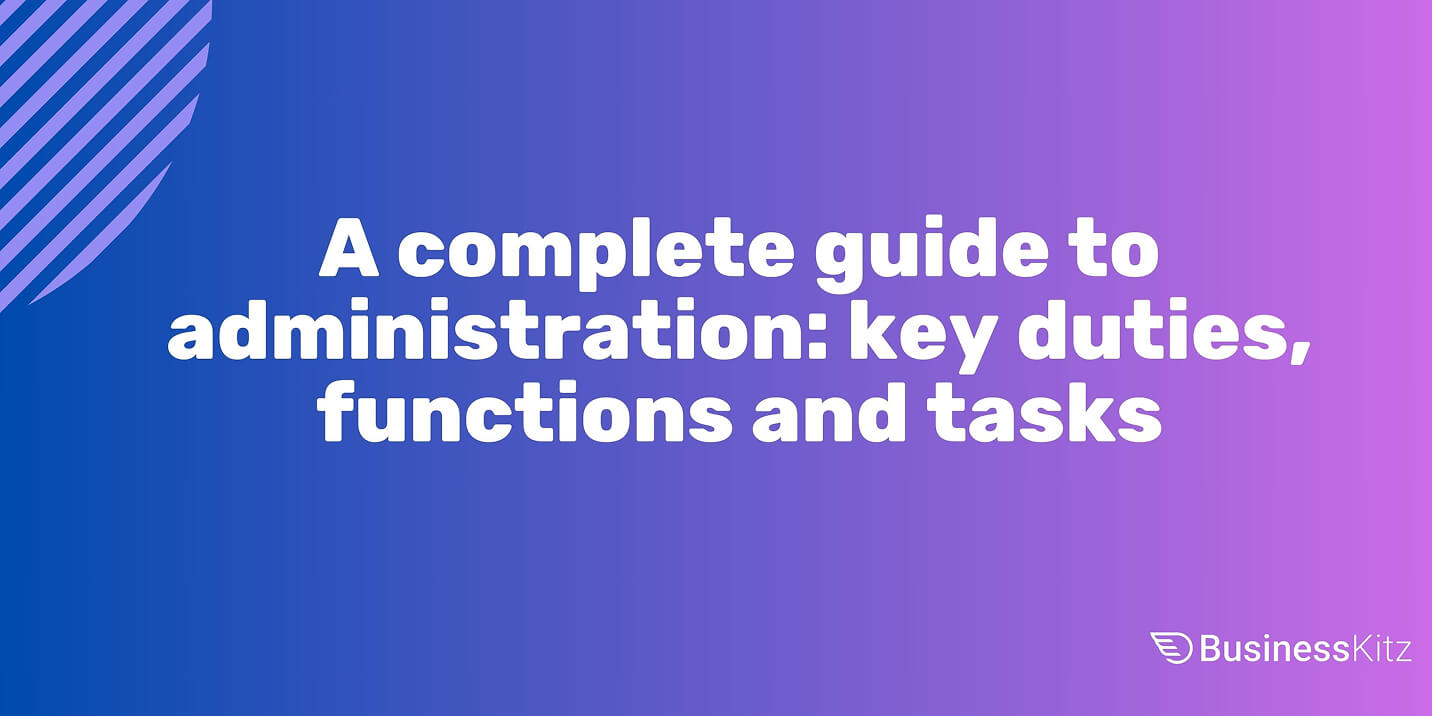
We've helped businesses save $55m with our all-in-one platform. Get instant access to this template and 115+ others, plus AI-powered document creation, starting completely free.
Every organisation relies on administration to function efficiently. It keeps businesses, government agencies, and non-profits structured by managing records, tracking finances, and ensuring compliance with laws. Without clear processes, organisations risk delays, errors, and legal issues. Administrators oversee daily operations, improve workflows, and help businesses meet their goals.
Administration ensures businesses stay organised by managing records, finances, and compliance. It involves handling document management, financial oversight, legal requirements, and workflow coordination to improve efficiency. Strong administration reduces errors, streamlines tasks, and supports business growth. Organisations can save time and operate effectively with the right processes and automation.
[ez-toc]

Administration involves planning, organising and overseeing daily tasks within an organisation. It ensures businesses and institutions function smoothly by managing resources, following regulations and improving productivity. Strong administration reduces errors, prevents financial mismanagement and supports long-term growth.
Businesses, government agencies and non-profit organisations rely on the administration for coordination, compliance and record-keeping. Without proper administration, organisations risk financial instability, inefficiency and legal penalties.
The role of administration varies by sector. Each type has unique responsibilities:
TypePurposeExample ResponsibilitiesCorporateManages business operations and ensures efficiency.Payroll, contracts, HR, compliance.LegalHandles court procedures and legal affairs.Estate administration, contracts, disputes.Public sectorSupports government departments and public services.Policy arrangement, public record-keeping.
Strong administration keeps a business structured and running smoothly. It ensures records are accurate, finances are managed, and regulations are followed. Without proper administration, businesses face confusion, errors and financial risks.

Technology simplifies administration by automating manual tasks and reducing errors. Digital tools help businesses manage contracts, payroll and record-keeping efficiently. These solutions:
Administrators must ensure their organisations follow laws and regulations. Failing to meet legal requirements can lead to fines, legal action and reputational damage. Strong administration reduces risk and helps businesses stay compliant.
Strong administration improves efficiency across all departments. It ensures accurate records, smooth communication and compliance with laws. Each department relies on structured processes to complete daily tasks and meet business goals.
Strong administration keeps operations running smoothly. Without clear processes, businesses waste time, make errors and struggle with compliance. Organising workflows improves efficiency and reduces stress.
Effective administration keeps businesses, legal settings and organisations running smoothly. It ensures compliance, improves efficiency and reduces errors. Without structured processes, businesses face delays, financial risks and legal issues.

Technology has changed how businesses handle administration. Digital tools reduce paperwork, speed up processes and improve accuracy. Automation also lowers costs by reducing manual work. Businesses that use modern systems work more efficiently and stay compliant with less effort.
1. AI-driven document management
2. Automated financial tracking and reporting
3. Digital contract signing platforms
TaskTraditional AdministrationModern AdministrationDocument storagePaper files in cabinetsCloud-based digital storageFinancial trackingManual bookkeepingAutomated accounting softwareContract signingPrinted contracts, physical signaturesDigital contracts with e-signaturesScheduling and remindersWritten calendars, manual trackingAutomated alerts and scheduling apps
A company may appoint an administrator when facing financial trouble. This helps restructure debts, protect assets, and avoid liquidation. It is a suitable step when directors want to save the business while considering creditor interests.
An administrator manages a company during insolvency. Their primary duty is to act in the best interests of creditors, not all stakeholders. They assess the company’s financial position, explore restructuring options and may sell assets to repay debts. Administrators must follow strict legal requirements and report on their decisions.
An administration order is a legal process where an external administrator takes control of a financially troubled company. In Australia, this process is governed by specific legal criteria. The administrator reviews the company’s financial position and recommends the best action, such as restructuring or liquidation—courts issue administration orders when a company meets certain insolvency conditions.
In Australia, company directors, creditors or courts can appoint an administrator. This ensures an independent professional takes control and assesses the company’s future. The appointment of an administrator protects businesses while solutions are explored.
Yes, a company can enter voluntary administration to assess its financial future. In Australia, directors or secured creditors can appoint an external administrator to control the company. The administrator investigates its affairs and determines whether it can be restructured or liquidation is necessary. The goal is to find the best outcome for creditors and, where possible, save the business.
Administrators who act quickly may apply for an urgent administration order. This protects a company from legal action while it assesses financial solutions.
Effective administration keeps businesses, legal settings and organisations running smoothly. It ensures compliance, improves efficiency and reduces errors. Without structured processes, businesses face delays, financial risks and legal issues.
✔ Administrators improve efficiency – They manage records, schedules and compliance to keep operations on track.
✔ Legal and compliance considerations – Proper administration ensures businesses follow industry laws and protect their interests.
✔ Technology makes administration easier – Automation reduces paperwork, speeds up processes and improves accuracy.
Strong administration helps businesses operate efficiently and meet their goals. Platforms like Business Kitz simplify administrative processes with digital contract signing, automated financial tracking and secure document management. Investing in the right tools saves time, reduces risks and improves business performance.
Copyright © 2025 Business Kitz 14312161